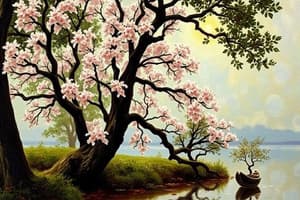Podcast
Questions and Answers
Which of the following is a notable space mission conducted by ISRO?
Which of the following is a notable space mission conducted by ISRO?
- Mars Rover
- Chandrayaan (correct)
- Voyager 1
- Hubble Space Telescope
During which period did the Sepoy Mutiny occur, leading to significant changes in British rule over India?
During which period did the Sepoy Mutiny occur, leading to significant changes in British rule over India?
- British Raj (correct)
- Medieval Period
- Ancient Period
- Post-Independence
Which economic indicator represents the total market value of all final goods and services produced in a country during a specific period?
Which economic indicator represents the total market value of all final goods and services produced in a country during a specific period?
- Employment rate
- Inflation rate
- GDP growth (correct)
- Trade balance
What is a key feature of the structure of government defined in the Indian Constitution?
What is a key feature of the structure of government defined in the Indian Constitution?
Which ancient civilization is known for its contributions to urban planning and architecture?
Which ancient civilization is known for its contributions to urban planning and architecture?
Which of the following is an important amendment related to fundamental rights in India?
Which of the following is an important amendment related to fundamental rights in India?
Which of these rivers is considered the longest river in India?
Which of these rivers is considered the longest river in India?
What major social issue has been a focal point for reform movements in contemporary India?
What major social issue has been a focal point for reform movements in contemporary India?
ভারতের সংবিধানে মৌলিক অধিকারের মধ্যে কোনটি অন্তর্ভুক্ত নয়?
ভারতের সংবিধানে মৌলিক অধিকারের মধ্যে কোনটি অন্তর্ভুক্ত নয়?
কোনটি ভারতের নির্বাচনি প্রক্রিয়ার একটি প্রধান বৈশিষ্ট্য নয়?
কোনটি ভারতের নির্বাচনি প্রক্রিয়ার একটি প্রধান বৈশিষ্ট্য নয়?
কোনটি একটি বৈজ্ঞানিক আবিষ্কার হিসাবে গণ্য করা হয় না?
কোনটি একটি বৈজ্ঞানিক আবিষ্কার হিসাবে গণ্য করা হয় না?
ভারতের স্বাধীনতা সংগ্রামের পরে কোন ঘটনা সরাসরি ঐতিহাসিক পরিবর্তনে ভূমিকা রেখেছে?
ভারতের স্বাধীনতা সংগ্রামের পরে কোন ঘটনা সরাসরি ঐতিহাসিক পরিবর্তনে ভূমিকা রেখেছে?
ভারতের কোন রাজ্যে সবচেয়ে বেশি অরণ্য অভ্যন্তরীণ সম্পদ পাওয়া যায়?
ভারতের কোন রাজ্যে সবচেয়ে বেশি অরণ্য অভ্যন্তরীণ সম্পদ পাওয়া যায়?
ভারতের কোন নগরী ২০১৮ সাল থেকে বজায় রাখা ক্লিন ইন্ডিয়া মিশনের একটি অংশ?
ভারতের কোন নগরী ২০১৮ সাল থেকে বজায় রাখা ক্লিন ইন্ডিয়া মিশনের একটি অংশ?
ভারতের কোন বিজ্ঞানী জীববিজ্ঞান এবং প্রযুক্তির ক্ষেত্রে নতুন আবিষ্কারগুলির জন্য খ্যাত?
ভারতের কোন বিজ্ঞানী জীববিজ্ঞান এবং প্রযুক্তির ক্ষেত্রে নতুন আবিষ্কারগুলির জন্য খ্যাত?
ভারতের কোন নদী দেশের সবচেয়ে দীর্ঘ নদী হিসাবে পরিচিত?
ভারতের কোন নদী দেশের সবচেয়ে দীর্ঘ নদী হিসাবে পরিচিত?
ভারতের কোন সংস্কৃতি বা খেলাধুলা বিষয়ে উল্লেখযোগ্য অর্জন হয়েছে?
ভারতের কোন সংস্কৃতি বা খেলাধুলা বিষয়ে উল্লেখযোগ্য অর্জন হয়েছে?
Flashcards are hidden until you start studying
Study Notes
General Awareness for SSC Exam
Science and Technology
- Basic Concepts: Understanding of fundamental scientific principles (e.g., physics, chemistry, biology).
- Current Developments:
- Recent advancements (AI, biotechnology, renewable energy).
- Notable scientific achievements and Nobel Prizes.
- Inventions and Discoveries: Key inventions and their inventors (e.g., telephone - Alexander Graham Bell).
- Space Missions: Notable space missions by ISRO, NASA, and others (e.g., Chandrayaan, Mars Rover).
Historical Events
- Ancient Civilizations: Contributions of Indus Valley Civilization, Vedic Period.
- Medieval Period: Important empires (Mughal Empire, Vijayanagara Empire).
- British Raj: Key events leading to independence (Sepoy Mutiny, Revolt of 1857).
- Post-Independence: Major policies and movements (Green Revolution, Emergency of 1975).
Current Affairs
- National News: Recent government policies, legislation, and initiatives.
- International Relations: Current diplomatic relations and major international treaties.
- Economic Updates: Important economic policies, budget highlights, and key statistics (GDP growth, inflation rate).
- Social Issues: Prominent issues such as healthcare, education reforms, and social justice movements.
Geography
- Physical Geography: Major landforms, climate zones, and ecosystems of India and the world.
- Human Geography: Population distribution, urbanization trends, and migration patterns.
- Important Locations: Major rivers, mountain ranges, and cities in India (e.g., Ganges, Himalayas).
- Environmental Issues: Current challenges such as pollution, climate change, and conservation efforts.
Indian Polity
- Constitution: Fundamental rights, duties, and the structure of government (executive, legislature, judiciary).
- Political System: Key political parties, electoral process, and major political leaders.
- Important Amendments: Recent constitutional amendments and their implications.
- Governance: Role of the President, Governor, and local self-governments in India.
Science and Technology
- Basic Concepts: Fundamentals of physics, chemistry, and biology are important. Examples: Newton's laws of motion, basic chemical reactions, cell structure and function.
- Current Developments: Artificial Intelligence, biotechnology, and renewable energy are significant areas to focus on.
- ** Notable Scientific Achievements**: Keep track of recent Nobel Prizes in science and the research behind them.
- Inventions and Discoveries: Know the inventor of key inventions such as the telephone, the light bulb, and the computer.
- Space Missions: Notable missions like India's Chandrayaan missions, NASA's Mars Rovers, and the International Space Station are essential to know.
Historical Events
- Ancient Civilizations: Study contributions of the Indus Valley Civilization, the Vedic period, ancient Indian philosophies, and major religions that originated in India.
- ** Medieval Period**: Learn about powerful empires like the Mughal Empire, the Vijayanagara Empire, and their rulers, and significant events during these periods.
- British Raj: Key events leading up to India's independence like the Sepoy Mutiny and the Revolt of 1857.
- Post-Independence: Important policies and movements such as the Green Revolution, the Emergency of 1975, and the rise of India as a global power.
Current Affairs
- National News: Stay updated on recent government policies, laws, and initiatives. Focus on policy changes and their impact on daily life.
- International Relations: Important international events, diplomatic relations between India and other countries, and major international treaties.
- Economic Updates: Know India's economic performance, budget highlights, GDP growth, inflation rates, and major economic reforms.
- Social Issues: Focus on current issues like healthcare, education, social justice movements, and their impact on the Indian population.
Geography
- Physical Geography: Study the major landforms, climate zones, and ecosystems of India and the world.
- Human Geography: Important topics include population distribution, urbanization patterns, migration trends within India.
- Important Locations: Memorize geographic names like major rivers, mountain ranges, and important cities in India.
- Environmental Issues: Focus on challenges like pollution, climate change, deforestation, and ongoing conservation efforts.
Indian Polity
- Constitution: Understand the fundamental rights, duties, and the structure of the Indian government, including the executive, legislature, and judiciary.
- Political System: Familiarize yourself with major political parties in India, the electoral process, and prominent political figures.
- Important Amendments: Learn about recent constitutional amendments and their impact on the Indian political system.
- Governance: Study the roles of the President, Governor, and local self-governments (panchayats and municipalities) within the Indian federal system.
Fundamental Rights
- Right to Equality: Enshrined in Article 14-18, guaranteeing equal protection of the law and prohibiting discrimination based on caste, religion, sex, or place of birth.
- Freedom of Speech and Expression: Guaranteed under Article 19, allowing individuals to express their opinions, beliefs, and ideas freely, with reasonable restrictions for national security, public order, etc.
- Protection against Discrimination: Article 15 prohibits discrimination on grounds of religion, race, caste, sex, or place of birth in access to public places, shops, and educational institutions.
Union and State Government
- Union Government: Consists of the President, the Prime Minister, and the Council of Ministers, responsible for national-level matters like defense, foreign policy, and currency.
- State Government: Headed by the Governor, Chief Minister, and the State Cabinet, responsible for issues like education, healthcare, and law enforcement, within each state.
- Comparison: While both governments have independent legislative and executive powers, the Union Government holds overarching authority in areas like defense, currency, and international relations; State Governments handle issues within their respective territories.
Constitution
- Preamble: A foundational document that states the basic principles and objectives of the Indian Constitution, including justice, liberty, equality, and fraternity.
- Amendments: The Constitution can be amended through a special process of majority vote in Parliament, reflecting the democratic and flexible nature of the political system.
- Important Articles: Key articles include Article 32 (right to constitutional remedies), Article 21 (right to life and liberty), and Article 17 (abolition of untouchability), highlighting fundamental rights and principles.
Election Process
- Lok Sabha: The lower house of Parliament, elected directly by the people through universal adult suffrage.
- Rajya Sabha: The upper house of Parliament, indirectly elected by the elected members of the state legislative assemblies, representing the states.
- Election Commission: An independent body responsible for conducting free and fair elections, overseeing the electoral process, and managing voter registration.
Judiciary
- Structure: The Indian judiciary operates on a hierarchical system, with the Supreme Court at the apex, followed by High Courts in each state, and subordinate courts at the district level.
- Major Courts: Supreme Court is the highest court, interpreting the Constitution, settling disputes between states, and reviewing the decisions of lower courts. High Courts hear appeals from lower courts and original jurisdiction in certain matters within their respective states.
- Landmark Judgments: Notable judgments like Kesavananda Bharati v. State of Kerala (1973), which upheld the basic structure doctrine, and M.C. Mehta v. Union of India (1986), addressing environmental pollution and the right to a clean environment.
Basic Concepts
- Newton's Laws of Motion: Describe fundamental principles governing motion, including inertia, acceleration, and the relationship between force and mass.
- Conservation of Energy: States that energy cannot be created or destroyed, but only transformed from one form to another, highlighting the underlying principles of energy transfer and transformation.
Recent Advancements
- Artificial Intelligence: Research and applications in areas like machine learning, natural language processing, and robotics, impacting various sectors from healthcare to finance.
- Space Technology: Development of space exploration technologies, satellites, and launch vehicles, contributing to communication, navigation, and scientific research.
- Renewable Energy: Growing emphasis on harnessing solar, wind, and hydro energy, promoting sustainable options for energy production and reducing reliance on fossil fuels.
- Biotechnology: Advances in genetic engineering, gene therapy, and biopharmaceuticals, leading to new treatments and breakthroughs in medicine and agriculture.
Space Missions
- Chandrayaan: India's lunar exploration program, involving missions like Chandrayaan-1 (2008) and Chandrayaan-2 (2019), aimed at mapping the lunar surface and studying its composition.
- Mangalyaan: India's successful Mars orbiter mission (2014), highlighting the country's technological prowess in space exploration and achieving cost-effective solutions.
Scientific Organizations
- ISRO (Indian Space Research Organisation): A national agency responsible for India's space program, conducting research, developing technologies, and launching satellites for various purposes.
- DRDO (Defence Research and Development Organisation): Responsible for developing defense technologies, including missiles, aircraft, and defense equipment, contributing to national security.
Important Discoveries
- Satyendra Nath Bose: Indian physicist who contributed significantly to the development of Bose-Einstein statistics, which describes the behavior of particles at low temperatures.
- C.V. Raman: Nobel Laureate in Physics (1930) for his discovery of the "Raman Effect", a phenomenon related to the scattering of light by molecules, which revolutionized our understanding of light scattering.
Freedom Struggle
- Non-Cooperation Movement (1920-22): A movement led by Mahatma Gandhi, urging Indians to boycott British goods and institutions, promoting peaceful resistance against British rule.
- Quit India Movement (1942): A mass movement demanding immediate independence from British rule, led by Gandhi with widespread participation across India.
Independence and Partition
- Events Leading to Independence: The movement for independence gained momentum after World War II, with increasing pressure on the British government to grant independence.
- Major Figures: Mahatma Gandhi, Jawaharlal Nehru, Sardar Vallabhbhai Patel, and others played significant roles in shaping the independence movement and negotiating with the British.
- Consequences: The partition of British India led to the creation of India and Pakistan, resulting in large-scale displacement, communal violence, and societal upheaval.
Revolutions
- Sepoy Mutiny (1857): A rebellion by Indian soldiers against the British East India Company, triggered by controversial cartridges greased with animal fat, which violated religious beliefs.
- Indigo Revolt (1859-60): A peasant uprising against the forced cultivation of indigo for British traders, highlighting the exploitation of farmers and the struggle for economic justice.
Historical Sites
- Ajanta Caves: Ancient rock-cut cave monuments in Maharashtra, known for their exquisite Buddhist paintings and sculptures, depicting stories from Buddhist scriptures.
- Red Fort: A historical fort in Delhi, built by Mughal emperor Shah Jahan, with significant historical importance as a symbol of Mughal power and later used as a residence by British rulers.
Domestic Politics
- Recent Developments: Recent political events, including elections, party politics, and government policies, impact the dynamics of Indian politics.
- Key Elections: General elections for Lok Sabha and state assembly elections are crucial in shaping the political landscape and determining the ruling government.
- Government Initiatives: Analyze recent programs and policies like the ‘Swachh Bharat Abhiyan’ (Clean India Mission), ‘Make in India’, and ‘Digital India’ aimed at addressing key development challenges.
International Relations
- India's Role: India plays an active role in global affairs, engaging in diplomacy, international organizations, and regional collaborations.
- Recent Treaties and Collaborations: Analyze important agreements and partnerships entered into by India, considering their implications for trade, security, and regional cooperation.
Economic Issues
- Current Economic Challenges: Analyze issues like unemployment, inflation, poverty, and economic disparity, assessing their impact and government responses.
- Policies: Evaluate recently implemented economic policies and their effectiveness in addressing economic challenges and promoting growth.
- Major Economic Events: Understand significant economic events, including fluctuations in the stock market, changes in interest rates, and major trade agreements negotiated by India.
Environment
- Climate Change Reports: Highlight reports and data on the impact of climate change on India, assessing its effects on agriculture, water resources, and coastal areas.
- Environmental Policies: Evaluate government policies and initiatives aimed at mitigating climate change, promoting sustainable development, and conserving natural resources.
- National Initiatives: Understand major environmental initiatives like ‘Swachh Bharat Abhiyan’ and other programs launched to address pollution, waste management, and conservation.
Sports and Culture
- Significant Achievements in Sports: Review recent achievements of Indian sportspersons in international competitions, highlighting successes in cricket, badminton, hockey, and other sports.
- Cultural Events: Identify important cultural events and festivals celebrated in India, highlighting their significance and contribution to the country's cultural heritage.
- Recognition of Artists: Acknowledge the work and achievements of renowned Indian artists, including musicians, filmmakers, dancers, and others, contributing to the cultural landscape.
Physical Features
- Major Rivers: Identify the major river systems, including the Ganges, Indus, Brahmaputra, and Godavari, highlighting their geographical importance, water resources, and role in irrigation and transportation.
- Mountain Ranges: Understand major mountain ranges, including the Himalayas, the Western Ghats, and the Eastern Ghats, understanding their impact on climate, biodiversity, and resource distribution.
Climate Zones
- Climatic Regions: Identify different climatic regions in India, including tropical monsoon, semi-arid, and arid regions, understanding the factors shaping each region's climate.
Indian States
- States and Territories: Understand the geographical features and cultural significance of each Indian state and union territory, highlighting unique features, cultural diversity, and contributions to the national identity.
Natural Resources
- Mineral Resources: Understand the distribution of key minerals, including iron ore, coal, manganese, and bauxite, assessing their role in economic activity and industrial development.
- Forests: Understand the different types of forests in India, including tropical rainforests, deciduous forests, and coniferous forests, emphasizing their importance for biodiversity, carbon sequestration, and water regulation.
- Water Bodies: Recognize major rivers, lakes, and coastal areas, emphasizing their contribution to the country's resources, agriculture, and fisheries sector.
Global Geography
- Key Countries: Understand major countries worldwide, their geographical locations, and their significance in global affairs.
- Capitals: Identify the capitals of major countries and their locations on a world map.
- Significant Geographical Features: Recognize and understand the major continents, oceans, mountain ranges, and other key geographical features.
Studying That Suits You
Use AI to generate personalized quizzes and flashcards to suit your learning preferences.




